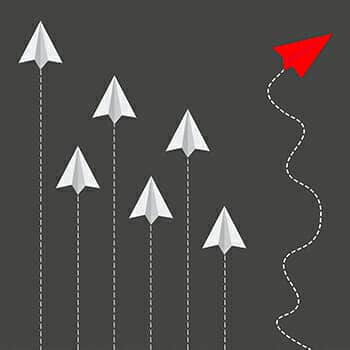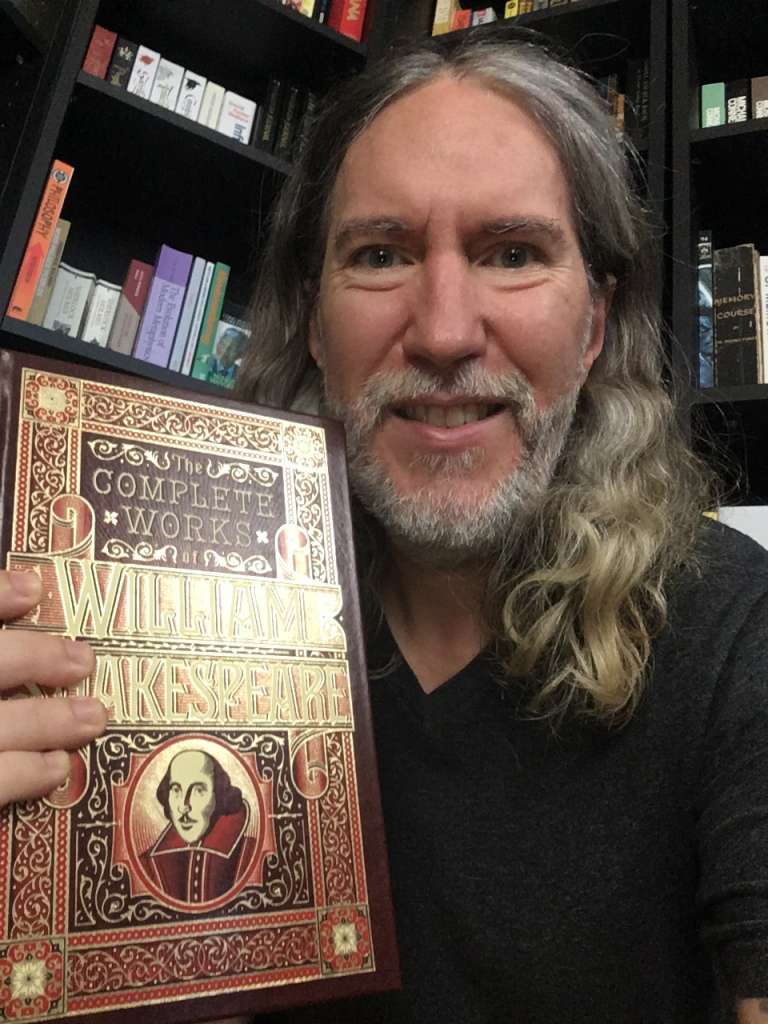Podcast: Download
Subscribe: Apple Podcasts | RSS
 All successful learners set learning goals.
All successful learners set learning goals.
Even if the exact path isn’t clear and there might be some wiggly lines involved, this truth matters above all:
You can’t expect success from self-directed study programs without at least forming some kind of destination.
And the truth is, having a clear destination in mind, isn’t always the best policy. Sometimes you have allow for a little wiggle room. If not a lot.
As someone who has been both student and professor, I can help you from both sides of the coin.
I’ve passed multiple exams based on many courses. But I’ve also gone on to learn on my own to learn new skills and research and write multiple books.
To help you out based on solid scientific research and experienced earned from preparing many outlines for my memory goals, let me give you some examples you can model.
And let me do even better than that:
In this post, I’ll show you how to create a learning goal that actually gets you the outcome you want.
Whether that’s learning a language, mastering a musical instrument or becoming an expert in a difficult topic, this is the blog post for you.
How cool is that?
Very cool, as you’re about to see. So let’s dive in.
What Are Learning Goals?
Learning goals are like destinations on a map.
You have never been to the location, but you know that it exists.
The reason you know it exists is either because others have been there, or others have tried to reach the destination.
And this is an important point:
A lot of people think that learning goals must be achievable.
Frankly, I think we have every reason to believe this simply is not true.
For example, must it be achievable that we do all we can to learn about space travel?
We don’t know if it’s actually possible or not, but we’re doing it.
To take a more down-to-earth example, I had no idea whether or not I would be able to understand many topics or learn some of the languages I’ve tackled.
And right now, as part of my current learning cycle, I’m studying physics. It’s really hard to understand, but I take heart from a quote I found early on from one of the most renowned physicists, Richard Feynman:
It is my task to convince you not to turn away [from physics] because you don’t understand it. You see, my students don’t understand it either. That’s because I don’t understand it. Nobody does.
Ultimately, this means that the exact definition of learning goals is exactly what I’ve suggested: It’s a destination. And all you need is an inkling that the destination exists just as Richard Feynman and millions of other people make learning goals based on their intuition that physics and math exist.
Examples Of Written Learning Goals
Of course, it’s easy to theorize. Here are some examples of my own written learning goals so you can see the principles in action.
Language Learning Goal
Every time I sit down to study a language, I start off by writing down my intention. I started doing this years ago with German, and here’s what I wrote:
By the end of one month, I will be able to hold conversations on everyday topics like travel, work and my hobbies. To accomplish this, I will memorize vocabulary and phrases in my language learning Memory Palaces daily and speak with a language exchange partner two times a week. I will listen to German radio and watch German movies for twenty minutes per day.
Reading Challenge
I rarely dread reading challenging books. But Gödel Escher Bach is legendary for its complexity and wards off many readers.
But because reading it is essential for understanding memory and consciousness, I helped myself get through it by writing the following goal:
Over the next 6 weeks, I will complete Gödel Escher Bach by reading at least 15 pages per day. I will write summaries as I go to better understand key themes in the book. I will also seek out at least three interviews with the author and take thorough notes from them.
Mastering Philosophical Concepts
A few ago, I decided I needed to understand Zen and related schools like Advaita Vedanta. For whatever reason, their core ideas had always evaded me.
To get that task done, here’s what I wrote:
In the next 6 months, I will thoroughly understand what these philosophical traditions mean by “no mind.” I will dedicate an hour each day to reading and an additional hour to practicing the recommended meditation techniques. I will supplement my understanding by watching lectures related to Zen and Advaita Vedanta.
Did I succeed?
Judging by the millions of views my TEDx Talk reporting on the mission has received, I’d say so.
Why Is It Important To Set Learning Goals For Improvement?
We need learning goals precisely because without a direction to follow, we wind up getting either nowhere, or someone other than we want to be.
Having goals for our learning also helps us identify others who have attempted and succeeded at similar projects.
It’s not just about goals either. Using mental metaphors based on images of other successful people is very helpful. Nir Eyal makes this point in his book Indistractable.
Carol Dweck says something similar in Mindset: The New Psychology of Success. Only she puts a bit of a twist on it:
We like to think of our champions and idols as superheroes who were born different from us. We don’t like to think of them as relatively ordinary people who made themselves extraordinary.
In other words, to be successful requires a combination of big dreams and thinking practically about how others have completed them. This process is sometimes called “reverse engineering.”
For example, you might notice where and when people act on their goals. This is a point suggested by Dr. Heidi Grant. We often think about the outcome when we actually need to visualize the process.
How to Write Learning Goals That Work:
4 Strategies for Writing Successful Learning Goals
When it comes to achieving our dreams, whether it’s learning the law or acing med school, one quote has always stuck with me. I heard it from a “business guru” named Dean Jackson:
All wealth comes from writing.
I’ve always found this to be true, so let’s start with some nuance on that tip.
One: Test Your Goals Through Writing
A core part of my teaching involves journaling. I’m talking both about journaling for self improvement and keeping a journal like a memory athlete.
When it comes to goals, I’ve found that it’s really important to write them down.
But not just once.
To really test that I want to go through something, I ask myself to write out the goal several times over a few days, if not weeks.
Why?
Because I’ve found that a goal I’m not willing to write out a few times signals I’m not really interested in completing it.
Plus, writing out a goal several times helps test the “truth” of the goal. Sometimes we just want an outcome for the sake of having it. But we don’t actually need the outcome.
So in the journal, I divide the page into two columns: Want vs. Need. By focusing on what I really need to learn, I wind up having much more free time and enjoyment at the end of the learning goal.
I know this process sounds challenging. But it’s 100% scientific. Angela Duckworth would likely file this kind of exercise under her concept of developing “grit.” I consider it an exercise that helps you establish and maintain mental strength.
Two: Decide Why, Where & When
Once you’ve tested that you really want to learn something, it’s important to keep journaling.
My three questions each morning before I engage in a learning activity always come with:
- Why?
- Where?
- When?
It’s a simple model that helps build both intrinsic and extrinsic motivation.
For example, I’m working on a book and part of my research involves reading Shakespeare to follow-up on someone’s suggestion that the great memory master Giordano Bruno may have influenced Shakespeare’s creation of Hamlet.
Shakespeare’s not exactly light reading, so I remind myself of why I’m doing it. Then I plan where and when I’m going to get the reading done.
This simple metric is useful to go through because it can help you choose times when you have the best possible energy for certain tasks as well.
Three: Give Yourself Space for Focused & Diffuse Modes of Thinking
Here’s one of my favorite learning goals examples:
- Study hermeticism
- Study the memory systems of Bruno and people like Ramon Llull
- Compare with multiple traditions and philosophies
- Compare with contemporary memory science and memory athletes like Ed Cooke
- Write up the findings in a book
If you want to know how to write a learning goal, that’s basically what the framework looks like. I then tested it as described above. As of this moment, the first draft of this book is now done based on my research and learning.
However, due to the enormity of the project, I couldn’t cover it all overnight. So I remembered lessons I learned from Barbara Oakley in her Learning How to Learn book and course. Some of these ideas area also in her excellent book, Mindshift.
Basically, you get very clear about when you’re going to study. But you used spaced repetition to take plenty of breaks.
This shifting between focus and taking time off for “diffuse thinking” allows the brain to form connections, primarily while you’re resting.
Four: Accelerate Everything Using Memory Techniques
Now, you might be thinking… I can learn while resting?
Yes, and it’s an important part of any learning routine, especially when studying tough subjects.
There are many ways memory techniques can help you:
- Mnemonic images make ideas stick faster
- Memory Palaces help you scale the amounts of raw data you can learn
- Spaced repetition speeds up how fast you can establish long term retention
If you’d like more information, please dive into my free memory improvement kit:
It will walk you through a learning plan for mastering your memory.
Crafting The Perfect Learning Goals Outline
Action is perfection when it comes to learning.
If you’re learning a new language, you need to speak and learn from mistakes.
And when you’re learning how to train your memory, you need to practice putting together the perfect routine.
Time management and setting goals also requires practice.
I suggest always keeping in mind the Feynman quote I shared above.
No one quite understands how to do anything perfectly, or what it means to master a study subject.
We need to keep humble and keep moving.
Action reveals and if you start with the journaling and testing process first, you’ll find that exactly how to accomplish your learning goals will tend to reveal itself to you.
So what do you say?
Dive into these suggestions and I can’t wait to hear about how you feel when you accomplish your learning goals with greater ease and efficiency!
Related Posts
- Gregg Shorthand: How to Write Shorthand and Take Notes Faster
Gregg shorthand symbols are easy and fast to learn when you have the right strategy.…
- The Most Controversial Language Learning Technique In The World
In this episode of the Magnetic Memory Method Podcast ... controversy about using mnemonics in…
- How to Use a Memory Palace for Language Learning
Using a Memory Palace for language learning is effective if you approach it the right…









2 Responses
DANG! It’s good to hear from you. Boy, how time turns a man around. The last time I wrote you, I promised I’d get back to your wonderful program after completing the Brain work I was doing. But a couple of health issues came up, and then I had a dream which more or less directed me to write a book that I really had reservation about tackling, but ultimately did. Now, having finished the book, now I feel compelled to prepare myself to acquire a literary agent and also find out what is really involved in the business of being a writer. So, that’s where I am now. (I’ve self-published several books before, but I never seemed to promote them energetically. And so much frustration and wasted-time was involved.)
It is so good hearing from you. Somehow I will try to maintain some communication with you and your program. The memory palace discipline sort of went bye-bye. I did use it successfully for one endeavor, but when I started memorizing one Shakespeare sonnet a month I lost my esteem for it. Oh, how I wish I could get back. I mean, I do spend periodically fifteen to thirty minutes in the wee morning hours tackling a sonnet, but it’s slow-go. But I can’t seem to get back to those palaces. As I’m typing this note, I sense I should try to apply your strategy again.
So, I hope you’re in as good a health as Nature permits, and I’m looking forward to less of a time gap between now and the next time we chat.
Mutually
satisfactorily,
Robert Wolff
Thanks, Robert, and great to hear from you as well.
Ultimately, writing is all about the marketing. I observe that Stephen King never misses the rounds on talk shows and short interviews on daytime TV. It’s part of how success works in this realm.
Regarding Shakespeare, you may like to dive into the poetry course and check out the recent “Magnetic SRS” update. I was memorizing a Shakespeare sonnet myself and a few passages from some plays and needed to be faster. And now you can use this updated approach to get faster too.
Enjoy and thanks so much for stopping by and commenting.